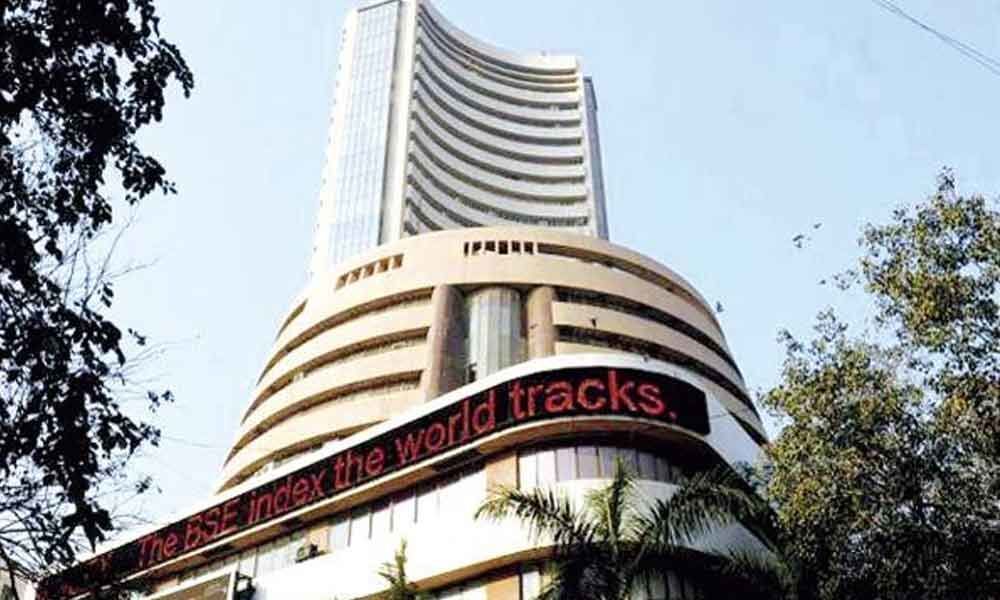Live
- Thousands Pay Tribute to Lance Havaldar Anoop Poojary in Udupi
- People should take advantage of Pradhan Mantri Surya Ghar: Muft Bijli Yojana: PM
- Tata Group to create 5 lakh manufacturing jobs over next half decade: N. Chandrasekaran
- Hansika’s charm remains undeniable
- Housing Sales Decline 4% in 2024, but Sales Value Rises 16% in India’s Top Cities: ANAROCK
- VHP to launch campaign from Jan 5 to free temples from govt control
- Israeli far-right minister visits flashpoint Jerusalem holy site, sparking criticism
- Keralites gulp down liquor worth Rs 152 crore over Christmas period
- Nani exudes style & intensity in ‘HIT 3’ new poster
- Journalist-writer Dr Rentala Jayadeva comes with a book ‘Mana Cinema.. First Reel’
Just In

A series of bad news has caused an erosion of Rs 13.7 lakh crore from the Indian capital markets in less than a month since the Union Budget was presented on July 5, leaving the markets battered and bruised.
Mumbai: A series of bad news has caused an erosion of Rs 13.7 lakh crore from the Indian capital markets in less than a month since the Union Budget was presented on July 5, leaving the markets battered and bruised.
In the past 19 sessions, the benchmark Sensex has lost over 3,400 points. Banking on high hopes from the new government, the Sensex had surpassed the 40,000-mark ahead of the Budget. But since then it has been mostly downhill.
The markets have now reversed all the gains made in 2019. In fact, all the gains in the first six months of 2019 have been reversed in one single month of July, largely on the account of one of the highest monthly outflows of foreign funds.
The retail investors are the worst hit. S&P mid-caps have shed nearly 1,180 points since July 5 to 1,3546 points on Friday. "There has been clear overdose of challenging news flow for the past one month," said Jagannadham Thunuguntla of Centrum Broking.
If the local concerns were not enough, the US-China trade talks took a turn for the worse. US President Donald Trump sent shock waves across the global markets after he announced that the US will put an additional tariff of 10 per cent on the remaining $300 billion of goods and products coming from China.
The global markets had already taken a hit after the US Federal Reserve indicated that the first rate cut since the 2008 financial crises was not the beginning of a rate cut cycle.
On the home front, the controversial super-rich tax caused immense panic among the foreign investors. Net Foreign Portfolio Investment (FPI) outflow crossed a massive Rs 16,000 crore.
The selling had intensified after Finance Minister Nirmala Sitharaman on July 18 ruled out any chance of a roll-back.
She also suggested conversion to corporate structure from trust structure as a solution in the face of heavy criticism over taxing a key-driver of stocks markets.
A chunk of the impact on the capital markets, however, came owing to the poor ongoing earnings season. Most companies have borne the brunt of wide-spread slowdown in the Indian economy.
Indian economic activity has shrunk for three consecutive quarters, surrendering the tag of the fastest growing economy in the world. A host of companies, from automobile makers, cement manufacturers to fast moving consumer goods (FMCG) makers are feeling the pinch of a slowdown in consumption, which is getting reflected on India Inc's balance sheet.
Tata Motors, India's largest commercial vehicle maker, has nearly doubled its loss in the June quarter over the same period last year, saying that "domestic auto industry has declined sharply and significantly."
The country's largest passenger car maker Maruti Suzuki has termed the demand environment as "uncertain". The company saw a 27.3 per cent decline in its year-on-year (y-o-y) net profit in the April-June quarter of FY20.
Ambuja Cement too said that the "pace of construction activities has slowed down due to liquidity issues in the market and weak demand".
In its outlook, it said that the government's current budgetary allocation in infrastructure development, affordable housing etc is expected to have a favourable impact on cement demand.
FMCG giant Hindustan Uniliver, which saw a significant decline in sales volumes during the June quarter, said that "the near term demand will remain subdued given the prevailing macroeconomic conditions."

© 2024 Hyderabad Media House Limited/The Hans India. All rights reserved. Powered by hocalwire.com







